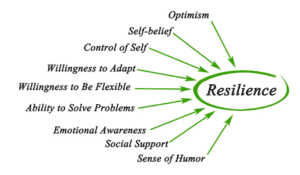Career Resilience for Career Success
What is resilience?
The definition of resilience: “The capacity to recover quickly from things unpleasant, such as difficulties, shock, injury etc…”
Sounds simple enough right? Put yourself in this situation, there’s traffic on the way into the office making you late. Your phone is ringing off the hook before you have even removed your jacket and you know you have a mountain of emails to get through. Never mind that to do list as long as your arm. Then as you are about to sit at your desk you are asked to join in with a meeting. Stressful?
Resilience isn’t just about dealing with the massive things; it’s about coping with those every day stressors that can start to get on top of you and effect how you feel along with your productivity.
Sometimes it is the big things. Something huge could be changing in the workplace such as a merger or someone leaving that directly affects you. But by practicing resilience with the small stuff then you’ll easier manage the bigger issues.
We all know that life in general is rarely plain sailing and there are challenges in the workplace that are no different. There can be bumps in the road and times when things don’t go as well as expected.

Accept things don’t always go your way
The first thing is to accept that things don’t always go your way.
But don’t stop there – that would be accepting defeat!
To be successful in your career you need to accept that there will be changes and difficulties and handle it well.
Showing resilience in the workplace
So how do we do that and show our peers and leaders that we are resilient in the workplace?
Firstly, consider your attitude towards the challenge. Is it an opportunity to learn? Could it be that there needs to be a change in the process? Is there something that could have been done differently to avoid the situation. Most importantly remain positive. Think about how you are dealing with the situation. How you want to feel and also how you want to be perceived?
Make sure you are displaying positive behaviours. Easier said than done by try not to get rattled. Take a step back, grab a water or cup of coffee and think it through. Consider the options and don’t be afraid to ask for help. Speaking to colleagues and leaders isn’t a sign of weakness, it demonstrates that you are keen to learn and want to resolve the issue. Once you have decided how to handle it put the plan into action.
Reflection to support Resilience
Finally, reflect on the situation. What could have been done differently? What have you learned and how can you apply that to situations in the future. Share the challenge and solution with your colleagues as they may come across the situation themselves and if there is a process that needs changing – talk to the powers that be.
Resilience is a skill
Resilience is a skill – it most definitely needs practice which means in order to practice you need a few knocks. You can practice on the smaller everyday stressors. Think about how those can be avoided and your attitude towards them. The beauty of resilience is that it isn’t something you are born with. It is something you can learn and once you have the skill you’ll be able to apply it to all sorts of situations.
Other ways to develop your own career resilience
You might well be thinking that you don’t feel very resilient, particularly if you’ve experienced recent setbacks. If so, don’t worry. Not many of us are lucky enough to be naturally resilient.
Be flexible in your thinking
Resilient people understand that things change and that carefully made plans might sometimes need to be amended or scrapped. So, being prepared to look at alternative routes to reach your goals, or possibly even changing your goals completely when necessary, is really important. For example, you might need to change the timescale that you had in mind for changing your career. You might need to think about an alternative route to reach your goal. You might need to think about a different career altogether, that’s going to be more realistic for you. So, it’s not being too fixed in your thinking.
Keep fit and healthy
There’s been a lot of research to show that getting enough sleep and exercise is important for managing stress, and for coping effectively with challenges that come up in your life. Good physical health can play a part in helping you build a sense of confidence and control, which is really crucial for building resilience.
Mental Fitness
As well as being physically fit, it’s also important to be mentally fit. Keep reading and learning.
Personal Support
Research shows having a strong support network will help reduce stress. Harnessing personal support might sound like common sense, but having an adviser of some sort, a friend, family member, even an online community to cheer you on through those difficult times, can really help you build resilience.
Setting realistic goals
Create a short term action plan to help you towards longer term goals. If you have a career goal in mind, consider if you need to undertake any training. Think about who in your network, you could speak to who is in a similar role and can share with you, their experiences.
Written by Nikki Phillips, Senior Recruitment Consultant covering the legal sector in Cumbria, Lancashire, Manchester, Cheshire, Merseyside and North Wales.
Get direct support
The Eventus Recruitment Group are experienced recruitment specialists in the Legal, Finance and Accountancy sectors. We offer a unique and tailored service and support professionals job searching and companies hiring at every stage of the recruitment process. If you would like some direct help and support from us, do not hesitate to contact us for a confidential discussion by clicking here.
Nikki headhunted me when I wasn’t even looking for a job. She explained the opportunity without being pushy.
Was supportive through the interview and offer process. Kept in touch during notice period. Rang to wish me luck the week before starting and checked I was OK after starting. Excellent service, best I’ve had in 22 years in legal. We’re already working together again on my new vacancies. – Steve, Operations Manager.
Further Reading
A guide to boosting resilience.


